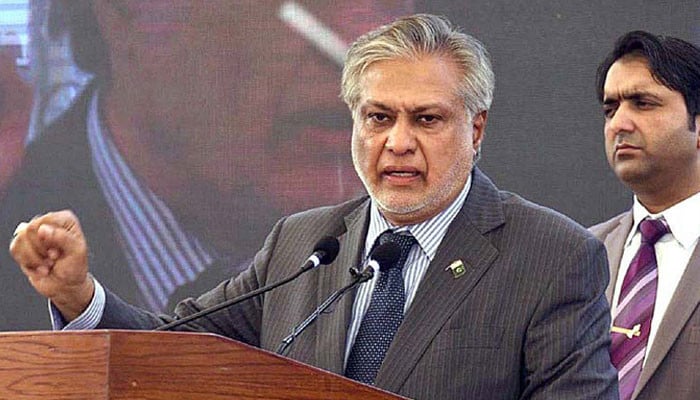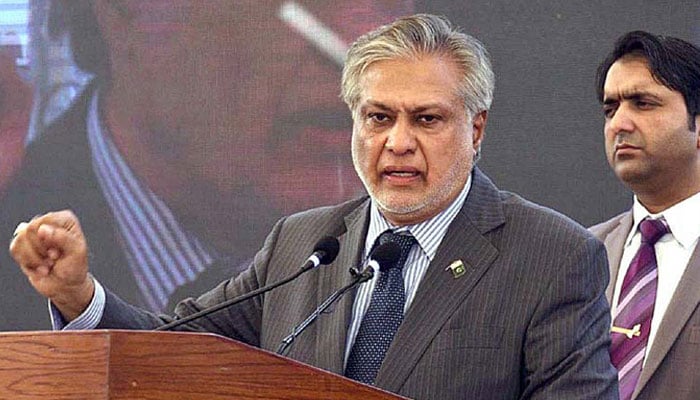Pakistan cannot cave in to all IMF demands: Ishaq Dar
ISLAMABAD: Following the International Monetary Fund’s (IMF) statement on the government’s failure to broaden the tax base through the proposed budget for the fiscal year 2023-24, Finance Minister Ishaq Dar on Thursday said that the country cannot cave in to all demands put fort by the global lender as it was a sovereign state.
Addressing the Senate Standing Committee on Finance and Revenue, he responded to the IMF objection to the tax exemptions given in the recently unveiled budget.
“Pakistan is a sovereign country and cannot accept everything from the IMF,” the financial czar told the parliamentarians. He also added that as a sovereign country, Islamabad should have the right to give some tax concessions. “The IMF wants us not to give tax concessions in any sector.”
The finance minister of the country assured the senators that the government knew how much tax it needs to collect and form where the revenue can be generated. He added that this was the reason the government increased the tax target from $7.2 trillion to $9.2 trillion in the upcoming budget.
“This target is apart from tax exemption. No budget is coming from tax-exempt sectors. We will take the IMF into confidence on this,” he said while urging that Pakistan should be allowed to decide on the matter.
The minister also added that the government in the new budget is focusing on four drivers for economic growth.
He also spoke about the package given to the IT sector, explaining that the government cannot “ban” giving concessions to the youth in the IT sector just on the IMF’s demands.
“We want to give employment opportunities to the youth through development in the IT sector,” the federal minister said. He added that the government has set a target of achieving $15 billion in IT exports in the next five years.
“IT exports were $2.5 billion this year which is very less. We want to take IT exports to $4.5 billion in the coming year,” he added.
‘Geopolitics happening against Pakistan’
Talking about the widespread default mongering, the finance minister said that geopolitics is happening against Pakistan so the country defaults.
“Foreign hostile elements want Pakistan to turn into another Sri Lanka and then the IMF negotiate with Islamabad,” Dar said.
Slamming the amendments made to the State Bank of Pakistan Act during the previous government’s tenure, he said amendments led to “a state within a state”.
“The amendments made to the State Bank Act are unsustainable,” he further added.
According to the finance minister, changes were made in the SBP’s governing laws but they are not complete yet.
On Pakistan’s external payments, he assured, once again, that the country will not defer any foreign payment.
“Pakistan does not need to go to Paris Club to reschedule loans. We will manage external payments of Pakistan,” he also said. The finance minister further added that even the managing director of the Washington-based lender had assured that Pakistan would not default and the country would get good news on June 30.
IMF goes public on Pakistan’s budget criticism
The minister also told the senators at length about the economy and the IMF as it was reported earlier today that the IMF had expressed dissatisfaction with Pakistan’s budget for the fiscal year 2023-24.
The IMF said the government has missed an opportunity to broaden the tax base and reduce tax expenditures as well as terms of tax amnesty against the fund’s programme conditionality.
Seeking major changes in the budget, the Washington-based lender stated it stands ready to refine this budget ahead of its passage from the Parliament.
In response to a question about the global lender’s opinion on the budget, IMF’s Resident Chief in Pakistan Esther Perez Ruiz said the staff remains engaged (with the government) to discuss policies to maintain stability.
“However, the draft FY24 budget misses an opportunity to broaden the tax base in a more progressive way, and the long list of new tax expenditures reduces further the fairness of the tax system and undercuts the resources needed for greater support for vulnerable BISP recipients and development spending,” she said.
“The new tax amnesty runs against the programme’s conditionality and governance agenda and creates a damaging precedent,” Esther said, adding that measures to address the energy sector’s liquidity pressures could be included alongside the broader budget strategy.
It said that the IMF team stands ready to work with the government in refining this budget ahead of its passage.
For all the latest business News Click Here


